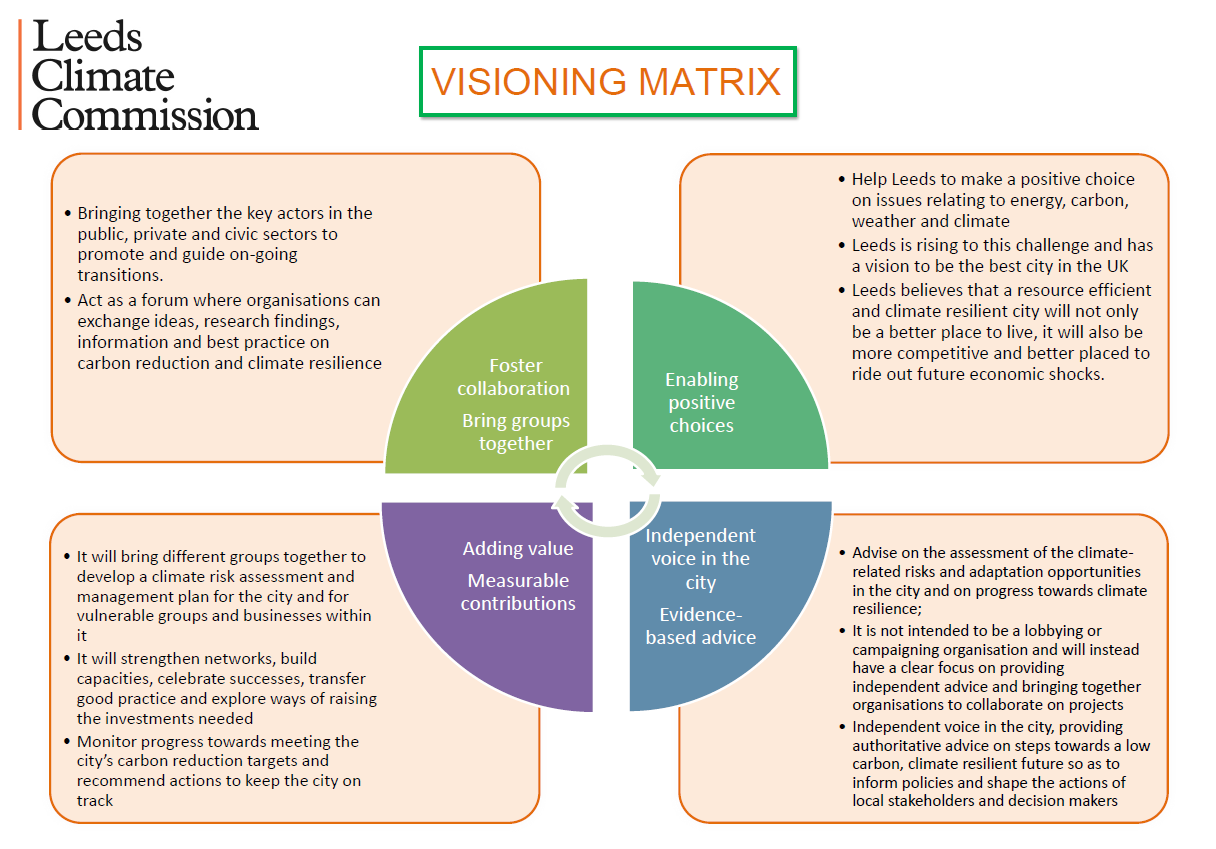What is the Commission about?
The Leeds Climate Commission was established in 2017 and was the very first climate commission, providing a blueprint for the growing number of other climate commissions that have developed since (see the Place-Based Climate Action Network).
It was inspired and informed by the work of the UK's Climate Change Committee and is an independent voice in the city, providing authoritative advice on steps towards a low carbon, climate resilient future so as to inform policies and shape the actions of local organisations and stakeholders. It monitors progress towards meeting the city’s carbon reduction targets, celebrates success stories and recommends actions to keep the city on track. (See our Vision Matrix, below.)
Who leads the Commission?
The Leeds Climate Commission is chaired by Professor Andy Gouldson (University of Leeds), with the vice chair from Leeds City Council (the Executive Board Member for Climate Change, Transport and Sustainable Development).
How is the Commission structured?
In 2020, the Commission led a Climate Action Readiness Assessment (CARA) process for Leeds. This process helped us to identify the priority areas where the Commission could add the most value as Leeds works towards its goal of becoming net zero by 2030.
In early 2021, the Commission was restructured to focus on these priority areas, with a refreshed Commission of c24 Commissioners meeting quarterly, and with new panels established to promote climate action in the areas of housing, transport and finance and investment.
The Commission will also support action in the public sector by collaborating with the Leeds Anchors Network, and in the commercial sector by working with the Leeds Property Forum.
The Commission will also maintain a communications and engagement group to connect with other initiatives such as Climate Action Leeds to promote the wider social, economic and environmental benefits for the city as it pursues net-zero by 2030.
Whilst it will continue to review climate resilience within the city, the Commission will work with the Yorkshire and Humber Climate Commission to promote adaptation at a regional scale.
Membership
As part of the restructuring process we are undertaking in early 2021, we are inviting applications from people with relevant experience in their sectors to join the planned panels on housing, transport, and finance and investment, or the refreshed engagement and communications group. There will also be an opportunity to apply to join us as a Commissioner. Information about how to apply will be made available on our website and social media channels soon.
What does the Commission want to do?
The Commission has to add value and make a tangible difference. People are willing to give their time and energy as long as they feel that we are making a difference.
The CARA process showed us where we’re more ready to act, but it also highlighted some of the key blockages preventing action, and we hope by focusing on these we can make the biggest difference. Some of these are policy related, and we can call for policy change within the city and, to some extent, also regionally. Nationally, we can say what policy changes we need but the message will be so much clearer if it comes from the wider network of Commissions associated with PCAN. A report published by PCAN, Trends in Local Climate Action in the UK, sets out policy asks to local and national government (read the report).
In other cases, we hope the Commission can catalyse change more directly, for example by helping to develop city-wide retrofit activities, by informing transport decisions or by developing a low carbon investment platform and prospectus. We are also planning to commence work on considering Consumption Based (Scope 3) emissions for the city as this is where there is potential to make significant carbon savings.
Achievements
- Changing the atmosphere around climate change by building a sense of shared ownership and a positive vision of what could be done through the Commission (see visioning matrix, below). This positive vision has helped the city to mainstream climate change into key areas of city life relating to transport, housing, jobs, health and so on.
- Informing the adoption of the city’s climate emergency commitment, and supporting/guiding associated policy changes for example relating to transport and housing.
- Organising a citizens’ jury process that has secured broader buy-in from across the city for ambitious climate action.
- Preparing a Net-Zero Carbon Roadmap for Leeds that builds on the recommendations of the citizens’ jury and that identifies targets and opportunities for low carbon action.
- Developing and completing a Climate Action Readiness Assessment that has identified opportunities for unlocking climate actions at the local level.
Challenges
- Maintaining momentum and keeping people on board as we grapple with some of the key challenges preventing action on the scale and at the pace required.
- A key challenge has been keeping people engaged whilst not being able to host any in-person meeting or events during the pandemic.
Commission documents
Our updated Terms of Reference are available to see in the downloads, along with our current Commissioners list and our Participation Principles for working groups.



